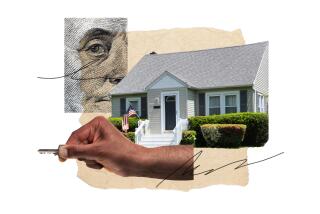History of economic exploitation still hinders black Americans
- Share via
Now that the confrontation between outraged black protesters and heavily armed white police in Ferguson, Mo., has subsided, most of America has moved on to other news. The police shooting of Michael Brown that sparked those protests did prompt a brief debate about the use of force by police in African American communities, and the U.S. Justice Department has stepped in to investigate bias, bad policies and poor community relations in the local police departments. But, as concerning as deadly encounters between cops and black kids may be, they are just one symptom of a far deeper problem of race that Americans continue to evade.
Yes, it is true that the most overt forms of racial discrimination have been banished. A black family lives in the White House. Black celebrities and sports stars are widely admired, even beloved, by white Americans. Where, 40 years ago, African Americans were nearly absent from TV screens, now black actors take the lead in numerous popular television programs and black spokesmen are the public faces of insurance companies and other corporate advertisers who would not be doing such a thing if they thought it would lose them money.
Plenty of examples can be found to show that the country has changed, enabling thousands of individual black Americans to achieve great success. As a result, many -- maybe most -- whites believe racism is a problem that has been solved. When it is pointed out that a high percentage of blacks still lag far behind in household income and net worth, as well as in educational achievement, the not-always-unspoken assumption among many white people is that blacks just need to work harder, get off welfare and stop committing crimes.
That assumption betrays a woeful ignorance of history and economics.
All but the most unrepentant racist knows that slavery was evil and that the years of Jim Crow and segregation in the South were little better. But, not everyone recognizes how, though those wicked days are past, their negative effects linger and fester. The economic toll on black people during the long decades of oppression was staggering. Many immigrants -- Irish, Italians, Chinese and others -- came to this country and suffered discrimination, too. Eventually, though, doors opened for all of them and bias withered away. They, or their descendants, were able to take part in the economic life of this society and build wealth over time. For black Americans, that opportunity came very late, if it came at all. (Only Native Americans were as cut off from America’s ever-expanding riches.)
From the arrival of the first slaves in the 17th century until emancipation in the 1860s, most blacks not only had no economic opportunities, the fruits of their very hard labor were stolen from them by their slave masters. After the Civil War, most continued to be locked in servitude as sharecroppers and servants. They were cheated, they were robbed, they were marginalized, brutalized and lynched. Economic advancement was nearly impossible.
A great many Southern blacks moved north seeking a better deal. Some found it, but many also found they were blocked from getting better-paying jobs, from putting their children in the best schools and from buying homes, even in poor neighborhoods. The economic rules and the legal system were rigged against them.
The cost of this exploitation is almost incalculable in monetary terms. The extreme damage done to community life, however, is all too obvious. It is the same damage evidenced in any poor community, but compounded by generations of neglect: poor health, undermined family structures, inadequate education, underemployment, crime, addiction, incarceration and social alienation.
Year after year, America spends millions of dollars on cops and prisons to contain the worst manifestations of this legacy of discrimination, but never do we take on the burdens of the black community as a burden we all share. Of course, black Americans must do their part -- and a great many are trying with all their might to break out of the cycle of violence, despair and economic insecurity in which they find themselves. But white Americans need to break out of the lazy smugness that allows them to ignore their own responsibility to their fellow citizens.
We are all in this together. It is long past time to face up to America’s greatest shame and spend the money, time and effort it will take to erase it once and for all.
More to Read
A cure for the common opinion
Get thought-provoking perspectives with our weekly newsletter.
You may occasionally receive promotional content from the Los Angeles Times.










